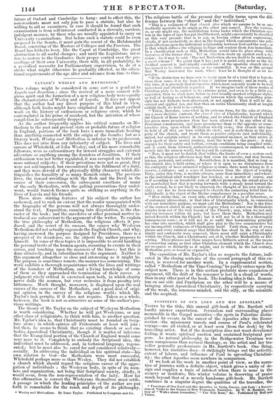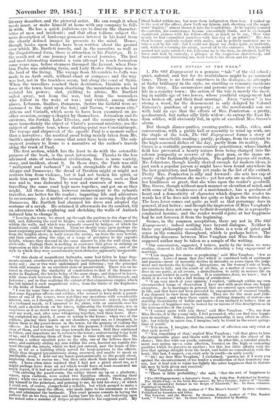FOOTSTEPS OF OUR LORD AND HIS APOSTLES. * TESTED by the
title, this annual gift-book of Mr. Bartlett will hardly answer expectation. Jerusalem and surrounding places memorable in the Gospel narrative—the spots in Palestine distin- guished by events in the career of the Apostles after the Resur- rection—the missionary travels and course of Paul's celebrated voyage—are all visited, or at least seen (from the deck) by the travelling artist. But if the description does not want devotional feeling, it wants spiritual unction and sustained Scriptural pur- pose. As natural philosophy in the Bridgewater Treatises was more conspicuous than natural theology, so the artist and lay tra- veller generally predominate in Mr. Bartlett's book. One thing, however, his narrative does—it strikingly brings out the activity, extent of labour, and influence of Paul in spreading Christian- ity : the other Apostles seem nowhere in comparison.
If we look at the work in another point of view, as the narra- tive of journies with a definite object, which gives a unity of de- sign and supplies a topic of interest when there is none in the scenery or incidents, this winter volume is deserving of praise much beyond that of a merely handsome gift-book. Mr. Bartlett combines in a singular degree the qualities of the traveller, the
• Footsteps of Our Lord and His Apostles, in Syria, Greece, and Italy • a Succes- sion of Visits to the Scenes of New Testament Narrative. By W. H. Bartlett, Au- thor of " Walks about Jerusalem," " The Nile Boat," &c. Published by Hall and Virtue. needs must, or make himself at home with any company he falls in with. He has a quick judicious eye to discern the character- istics of men and incidents ; and that often tedious subject the mere description of landscape possesses interest in his hand from the clearly defined images he presents to the mind. Hence, though books upon books have been written about the ground over which Mr. Bartlett travels, and in the narrative as well as the disquisitional form, there is attraction in his Footst(ps. It is the result not of one journey but of several journies. The first and most interesting narrates a vain attempt to reach Jerusalem some years ago, before steamers thronged the Levant, when Ibra- him Paella was subduing Syria, and Lady Hester Stanhope was in the land of the living. The voyage from Alexandria to Jaffa was made in an Arab craft, without chart or compass ; and the way was lost, not in the trackless ocean, but along the coast of Syria. 1Vhen the travellers reached their destination, Ibrahim was in force at the town, bent upon chastising the mountaineers who had resisted his power; and, yielding to advice, Mr. Bartlett sailed away, not from the war, but from the marauders who follow in the wake of war ; and visited, among other places, Lebanon, Baalbee, Damascus, (before the faithful were ac- customed to the sight of the hat,) and Tarsus, " no mean city." Athens and Corinth, which seem to have been examined on an- other occasion, occupy a chapter by themselves. Jerusalem and its environs, the Jordan, Lake Tiberias, and the country which was more immediately the object of Christ's personal ministry, are the subject of another tour, whose starting-point was Constantinople. The voyage and shipwreck of the apostle Paul is a memoir rather than a narrative ; the nautical proof being mainly taken from Mr. Smith's analysis of the course that must have been run. The sub- sequent journey to Rome is a narrative of the author's travels along the track of Paul.
The first section, which has the least to do with the ostensible purpose of the book, is the most interesting. Thanks to the less advanced state of mechanical civilization, there is more variety, story, and incident, about it. In those days, the Turk was still " malignant and turbaned " in such strongholds of the faith as Aleppo and Damascus ; the dread of Ibrahim might or might not restrain him from violence, but it had not broken his spirit, or made him sport the fez. The normal state of Syria, such as that was and is, was dislocated by war and rumours of wars. Men travelling the same road kept more together, and got on as they might. All these things, however inconvenient to the sybarite traveller, are better for the reader ; imparting life and adventure to occurrences. As a matter of convenience in moving freely about Damascus, Mr. Bartlett had changed his dress and adopted the costume of a rayah. He retained it afterwards for its comfort, till an adventure while exploring and sketching the walls of Antioch induced him to change it.
"Leaving the town, we struck up through the gardens to the slope of the hill, and, following the road to Aleppo, soon entered a wild ravine, enclosed within the walls, and which was formerly crossed by bridges, of which the foundations could still be traced. Then we shortly came upon perhaps the most surprising part of the ancient fortifications. The wall, descending steeply from the heights above, is built across the ravine, up from the very bottom, and then carried along the edge of a range of precipices to the opposite height, whence they descend in the same manner to join the wall along the river-side. Perhaps there is nothing in existence that gives so striking an impression as this of the daring genius of the Roman engineers, and of the style in which they were accustomed to treat obstacles apparently insuperable.
"Of this chain of magnificent bulwarks, some had fallen in huge frag- ments around, overthrown probably by the earthquakes that have shaken the rocky soil ; one or two were undermined and tottering ; but the principal chain still remains in an excellent state of preservation. There was an in- terest in observing the similarity of construction to that of the Roman re- mains in England, the bricks being of the same shape, and disposed in layers, with stone-work between them, like those of St. Alban's, Richborough, and Leicester ; and in thus realizing the extent of that stupendous empire, which has left behind it such magnificent relics, from the banks of the Euphrates to the firths of Scotland.
" I was for some time so absorbed in my occupation, as hardly to perceive that some Egyptian officers and soldiers, who seemed to have made a guard- house of one of the towers, were watching my operations with considerable interest, and, as I thought, sonic slight degree of mistrust : indeed, the sight of a turbaned ravah, as I appeared to be, alone, with an umbrella over his head, and a sketch-book on his knees, delineating the fortifications, was as suspicious as it no doubt was grotesque. They came up, saluted me, looked over my work, and, after some whispering together, took their leave. Hav- ing completed may sketch, I arose to return to the house ; when two of the soldiers, placing their hands on my shoulders, urged me, as I imagined, to follow them to the guard-house in the tower, for the purpose of visiting the officers. As I had no time to spare for this purpose, I civilly shook myself clear of them, and retraced my steps towards the town. Still they continued to follow, and importune me to return to the tower; endeavouring to lay hold of me, and I thrusting them off from time to time with my umbrella. On receiving a rather smartish poke in the ribs, one of the fellows drew his sabre, and suddenly sliding my arm within his own, hurried me rapidly for- ward through the streets, which we had just entered, past the house of Gir- gins, as far as a building which served for head-quarters to the officers. While thus dragged ignominiously along, unarmed, and unable to speak an intelligible word, I held out my hands pantomimically to the people about, imploring them to rescue me ; but they only shook their heads and turned aside. I have often since rejoiced that I had not a pistol about me, as I might perhaps have done an act which would have at least occasioned me much regret, if it had not involved me in serious difficulty. "On entering the guard-room, the soldier thrust me up on a platform ; where, upon cushions, were seated two Egyptian officers, smoking their pipes_ ; while two or three attendants were standing around. Then, address- ing himself to the principal, and pointing to me, he told his story ; of which I could not, of course, comprehend a syllable, but which seemed to make a great impression upon the officer, who made signs to his attendants to seize me, and administer the bastinado. This cruel process consists in laying the sufferer flat on his face, raising and laying bare his feet, and bestowing upon his naked soles a number of stripes proportioned to his supposed guilt. My literary describer, and the pictorial artist. He can rough it when blood boiled within me, but more from indignation than fear. I rushed up to the seat of the officer, drew forth my finnan, and, shouting out the magic word 'Inglese !' almost thrust it into his bearded face. As he rapidly scanned its contents, his countenance became exceedingly blank, and he exchanged significant glances with his fellow-officer, as much as to say, 'How very nearly we had committed ourselves with this dog of an infidel! ' His face then became suddenly radiant with smiles, and he politely motioned me to take a scat by his side : but I could not digest my choler quite so suddenly, and, without returning his salute, moved off to the entrance. Yet his mind seemed not quite satisfied ; for, following me to the door, he obtained, half by force and half by entreaty, a glimpse at the suspicious sketch-book, and then courteously dismissing me, went back to his divan and his pipe."



























 Previous page
Previous page